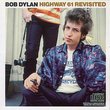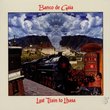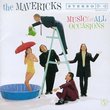| All Artists: Huun-Huur-Tu Title: Orphans Lament Members Wishing: 1 Total Copies: 0 Label: Shanachie Release Date: 11/23/1994 Genres: International Music, Pop Style: Far East & Asia Number of Discs: 1 SwapaCD Credits: 1 UPCs: 016351645821, 016351645845, 669910086155 |
Search - Huun-Huur-Tu :: Orphans Lament
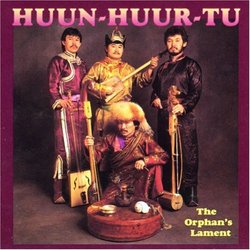 | Huun-Huur-Tu Orphans Lament Genres: International Music, Pop
|
Larger Image |
CD DetailsSimilar CDs
Similarly Requested CDs
|
CD ReviewsNight sky over the steppe Pharoah S. Wail | Inner Space | 01/13/2000 (5 out of 5 stars) "I am writing this to refute the previous review that called this "Mongol techno music". "Techno" would seem to hint that this is electronic music that just happens to also have Tuvan-style vocals. That is 100% not the case! The music on this cd is completely acoustic and played on traditional and non-traditional Tuvan instruments, and the previous reviewer has no familiarity with Nepalese music, because it does not sound like this, nor does this music have any rap-like qualities. I also disagree with the "official review" that called this "musically naive at first listen". There is nothing naive about the level of musicianship and/or vocal ability that the men on this cd possess. Tuvan throat-singing is really something to behold. Whereas Tibetan Buddhist-style throat-singing seems to stop and start while already in the overtone, Tuvan throat-singing usually starts in a normal voice (one note) and then in mid note or phrase the singers will shift into the overtones, and their actual overtones sound vastly different than those of the Tibetans as well. In short, this is some of the most beautifully ethereal-yet-rustic music ever recorded. A couple (of the many) standout tracks are STEPPE and KHOMUZ MEDLEY." Huun-Huur-Tu's 2nd album improves on the first woburnmusicfan | Woburn, MA United States | 06/14/2002 (4 out of 5 stars) "Tuvan throat-singing techniques allow a singer to sing two notes at once, a low drone and a higher melody made of the overtones of the low note. Huun-Huur-Tu specializes in old Tuvan songs that were in danger of being forgotten during the long Soviet reign. This album is an improvement over their first album, "60 Horses in My Herd", by adding Anatoli Kuular's strong tenor to the band. Kuular has the best voice I've heard in Tuvan music, and he and Kaigal-ool Khovalyg provide a great one-two punch here. My favorite song is "Aa-shuu Dekei-oo"; other highlights are the "Exile's Song" and "Agitator". Every Tuvan album includes some khomuz jaw harp, and that's usually the low point of the album for me--the medley of khomuz here is perhaps the most listenable I've heard. The instrumentation is mostly simplified variations on violins and banjos, and the playing is pretty basic." Contemporary offerings in traditional Tuvan styles. woburnmusicfan | 09/15/1998 (4 out of 5 stars) "A work of well-produced art, contemporary offerings in traditional Tuvan styles, not an ethnomusicological assay. Its 16 pieces in styles varying from unison Kargyraa chants to political songs to khomus ("Jews' harp") solos provide a tour-de-force of Tuvan styles designed for listening pleasure and wonderment. Master khoomigch Kaigal-ool Khovalyg's deeply touching igil (Tuvan viol) playing is (as on "60 Horses") a real highlight of the album. His frequent vocal solos in all styles, and those of the sweet-voiced Anatoli Kuular, joined by Mergen Mongush for one sygyt cut, help place this album among the two or three "must-have"'s for anyone who *enjoys* authentic Tuvan music."
|

 Track Listings (16) - Disc #1
Track Listings (16) - Disc #1
